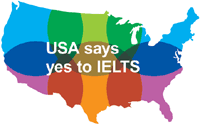Study in USA
Irrespective of problem-areas, the United States of America (USA) will (most probably!) be the hottest destination for Indian and international students. It is not difficult to determine why. The quality of education, wide-ranging specialties, flexibility, large campuses, friendly professors, funding and international opportunities are only but a few of the reasons for attracting the elite students from throughout the world. It is not so easy to dislodge the pre-eminent position of US as the 'land of opportunities'.
There are more than 3,800 universities and colleges in the USA, offering right from short-term certificate programs to Post-Doctoral level degrees. Most students prefer to study in the USA at either the Bachelors level or Masters and beyond.
Master's level is the most popular among Indian students who would like to chalk their career plans for higher education. More than 78% of Indian students apply for Master's level programs in US universities.
At this level, Engineering and its specialties (MS) are most popular, followed by Management (MBA) and other subjects like Pharmacy, Public Health, Physiotherapy and other programs.
Each of the specialization has its own typical requirements for application, admission and all aspects further education in USA.
Through the links on this pages and elsewhere on our site, Aegis Overseas will demystify the process of studying in USA.
Education System
Education system in the USA is different from the British system of education as practiced by India and from other countries.
After the Nursery school and Kindergarten, primary or elementary education starts which will be from first to sixth grade. Grades from 7th to 12th is known as secondary education in which seventh to nineth are known as Junior High School grades and 10th to 12th are known as Senior High School Grades.
One could join the first year of college, either in a community college which offers a two-year Associate degree or a technical institute of similar duration programs. Completion of this level will make one eligible to take up two more years of the undergraduate program at a four-year college or a university, on completion of which leads to a Bachelor's degree.
A Master's degree after that could be between one to two years. And Doctoral level education could be simultaneous along with the Master's or additional, which can be another 3-4 years.
On completion of two years in college (first two years of Bachelor's program) one could join a first professional degree, which will be an additional four years. First professional degrees are normally offered in Pharmacy, Dentistry, Physiotherapy, Law, Medicine, Veterinary Medicine etc. In some fields, the master's degree is the next highest degree awarded after completion of the first professional degree.
Finally, once a student earns his doctoral degree, he could pursue further research/study as a Post-Doctoral Fellow, which is the highest level of education anywhere in the world.
Employment - as a student
Students at any level are not allowed to work full-time, while studying in the USA. However, employment of international students, who reached USA on a non-immigrant visa such as F-1, is strictly regulated.
If such students maintain their visa status and be in good standing, they could work part-time and on campus only for upto 20 hours a week. During holidays and college breaks, students could work full-time, if they maintain the good standing.
Under special circumstances, students could seek approval from the Department of Homeland Security (through their respective college) to work full-time in case of 'economic necessity' or if they experience unexpected financial crises. Such full-time work is possible only after one year of stay in the US and after proper endorsement on the I-20 by the International Student Adviser of the university where the student is enrolled.
Even Off-campus employment must be authorized in writing.
After completion of education, any student could take up Curricular Practical Training (CPT) or internship, for a period of one year with companies in the USA, which is normally the first step to seek a more regular employment under H1B category, for further stay.
IELTS in USA
Over 2,000 US universities and professional bodies accept IELTS scores as proof of English language skills. Over 1,000,000 people a year are now using IELTS to open doors throughout the English-speaking world and beyond.
For USA
Quick Enquiry
News & Events
We provide We provide guidance about universities and courses offered across the globe.
We provide We provide guidance about universities and courses offered across the globe.


